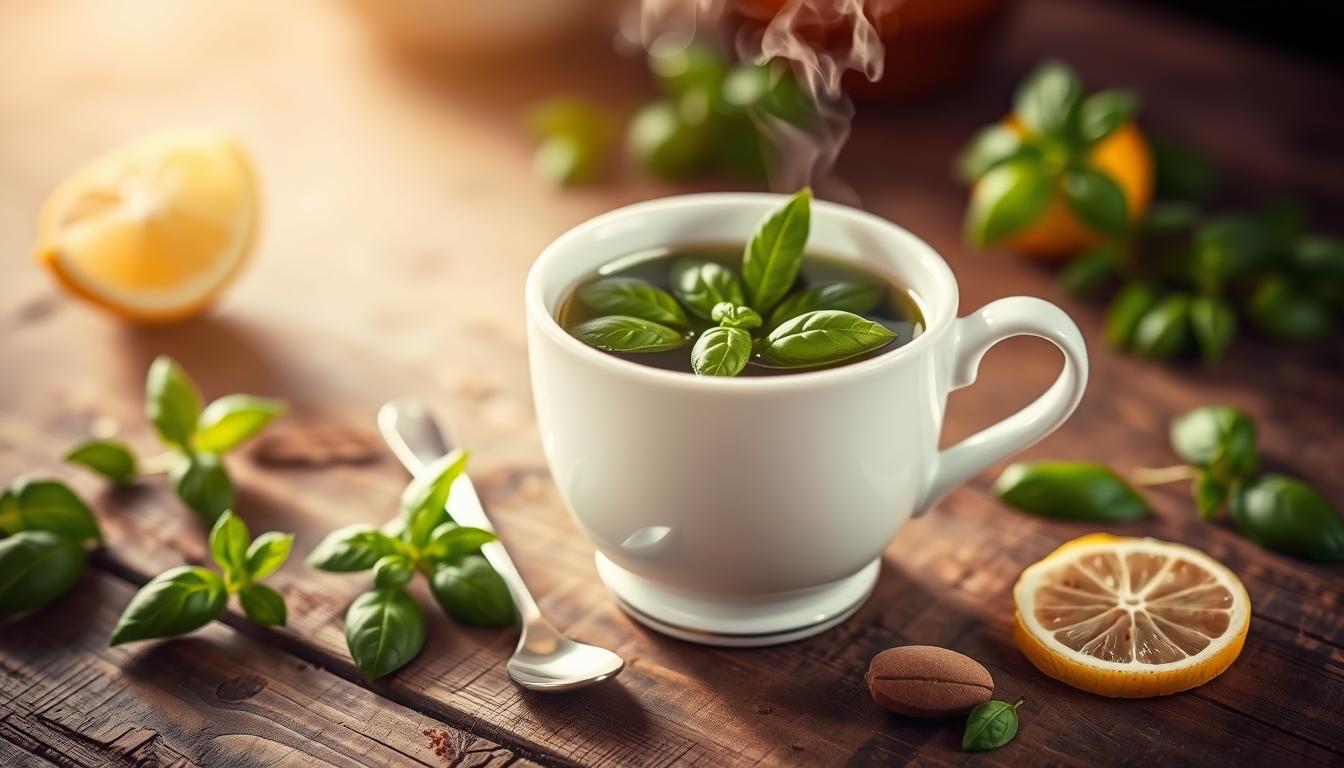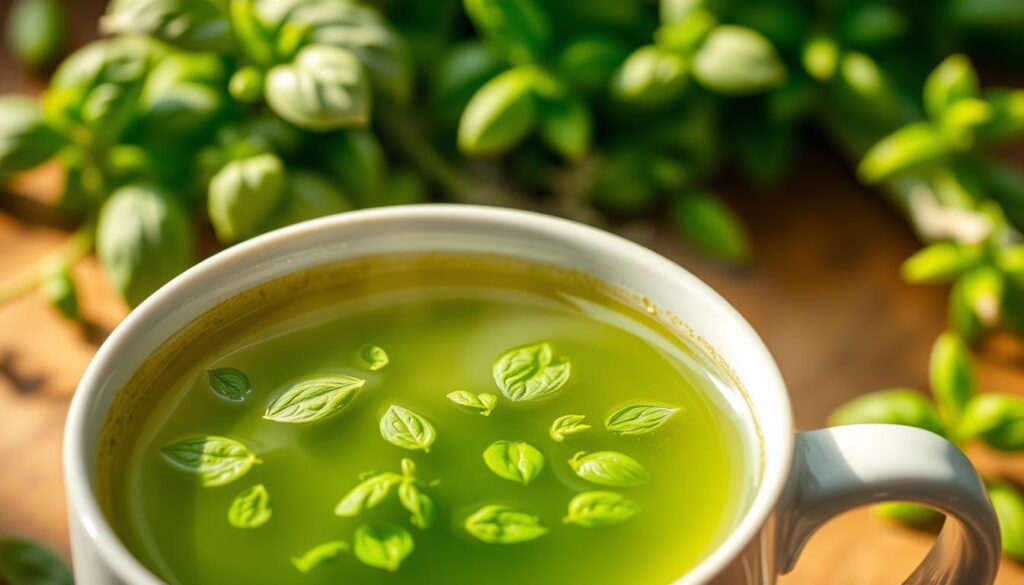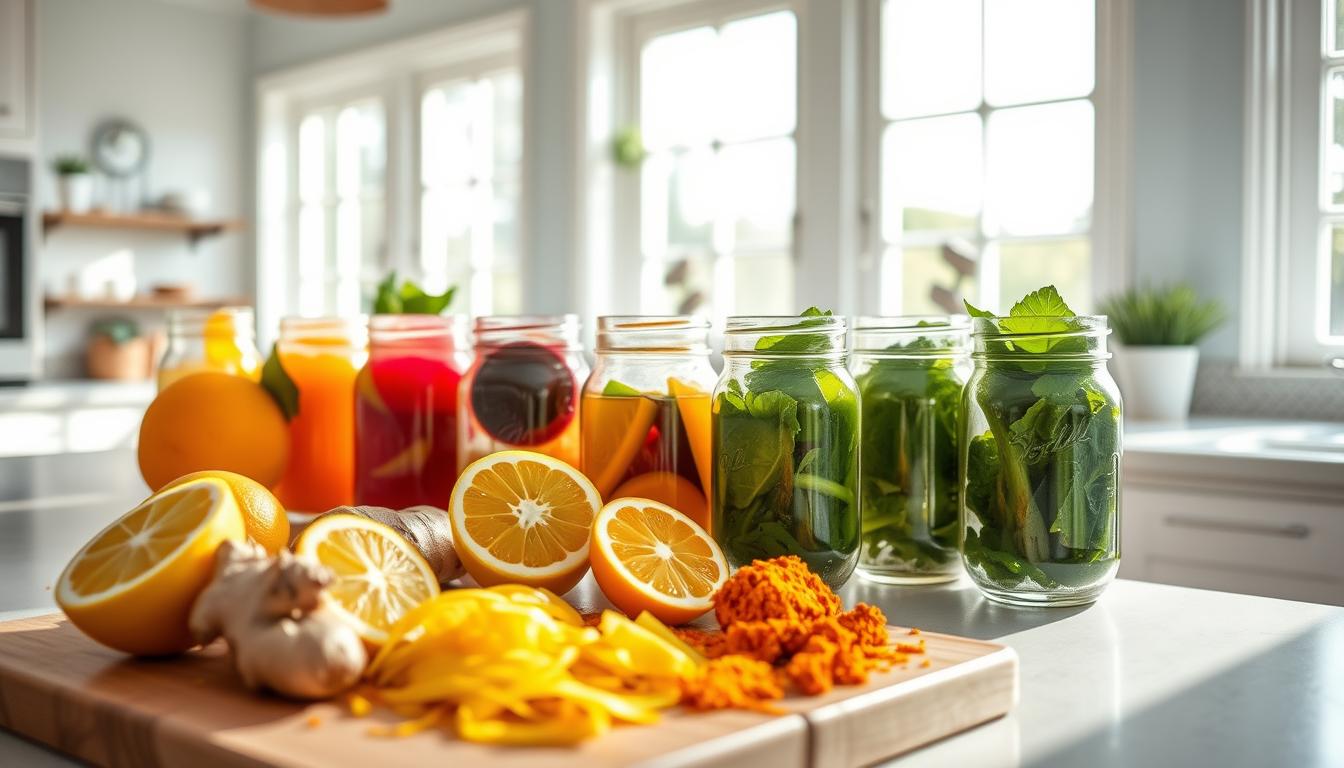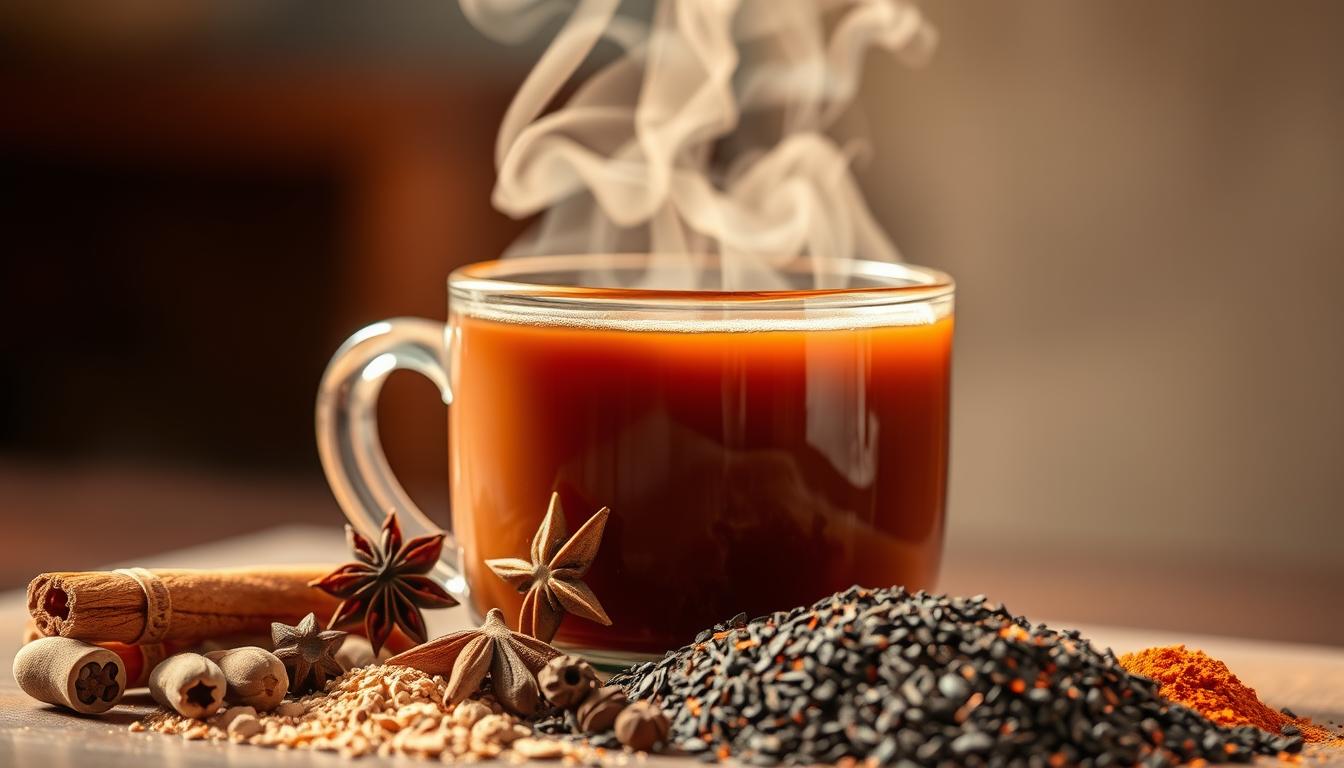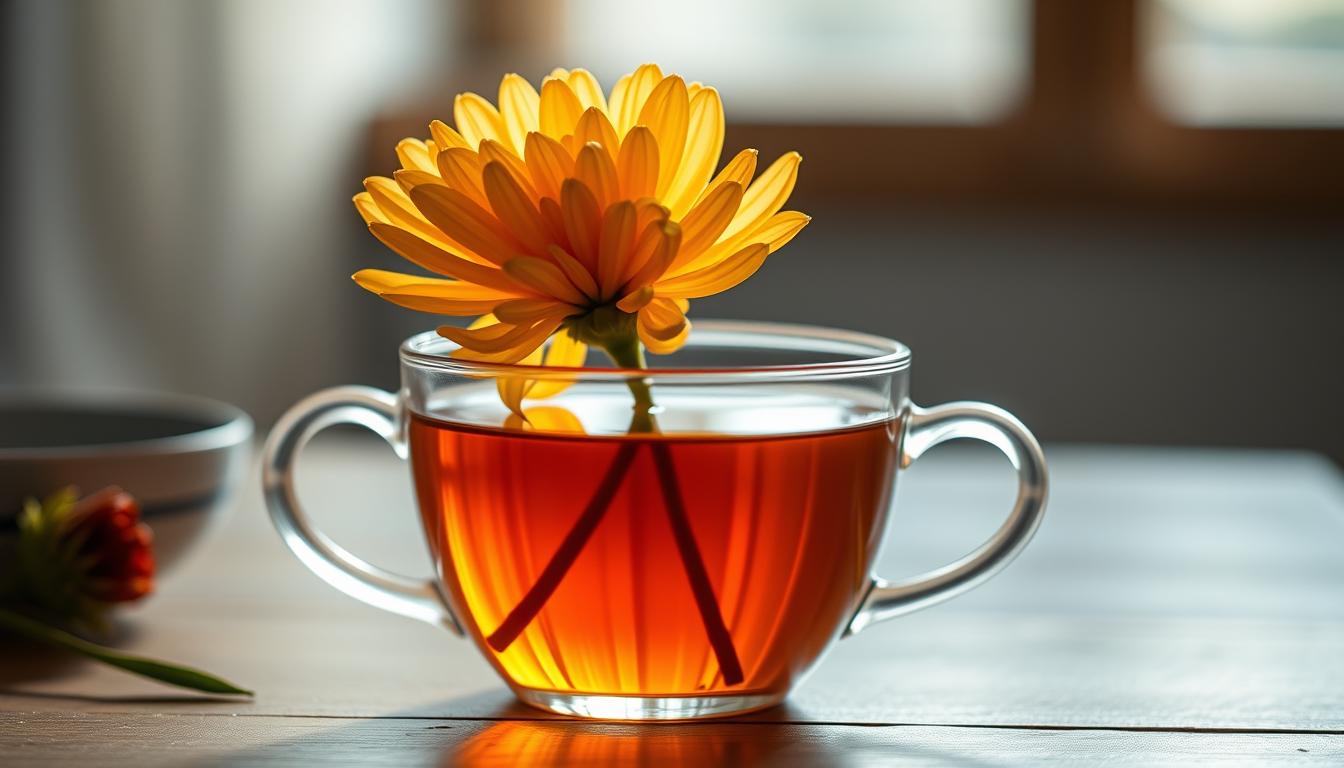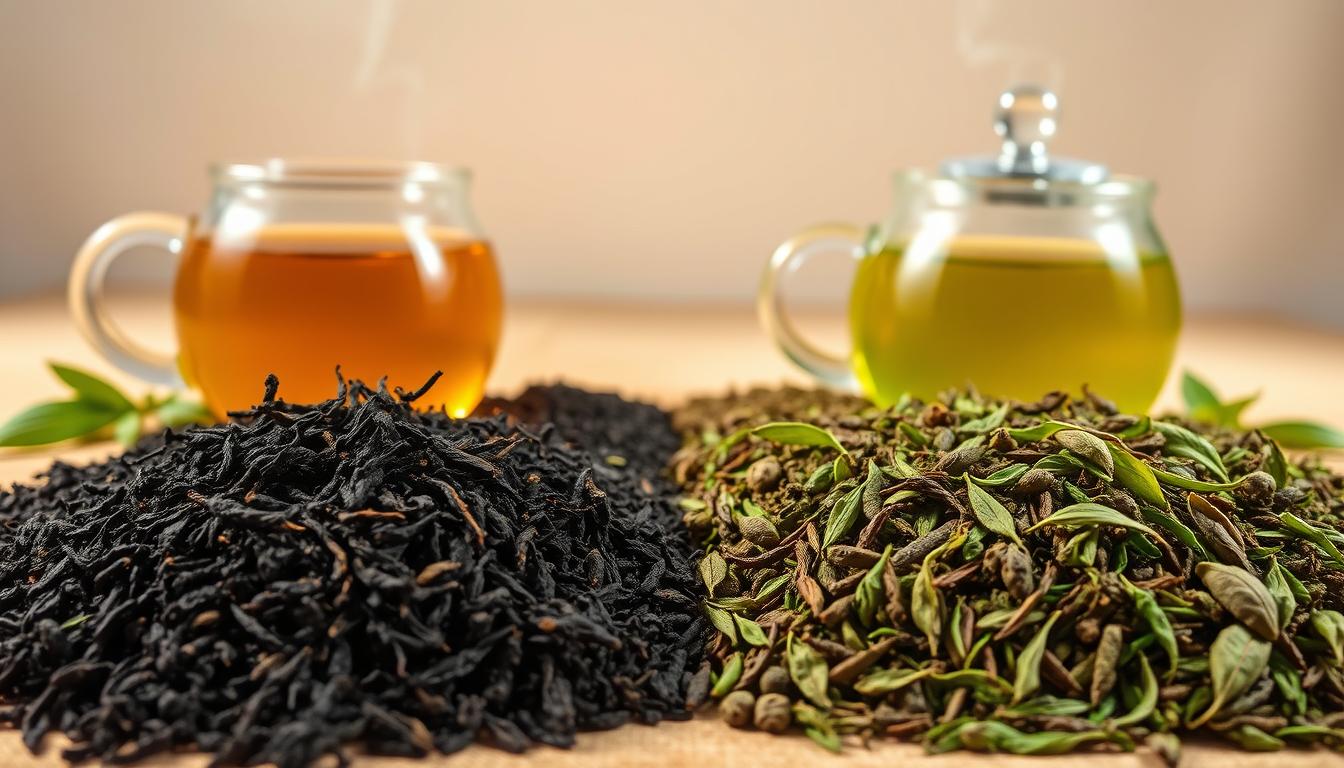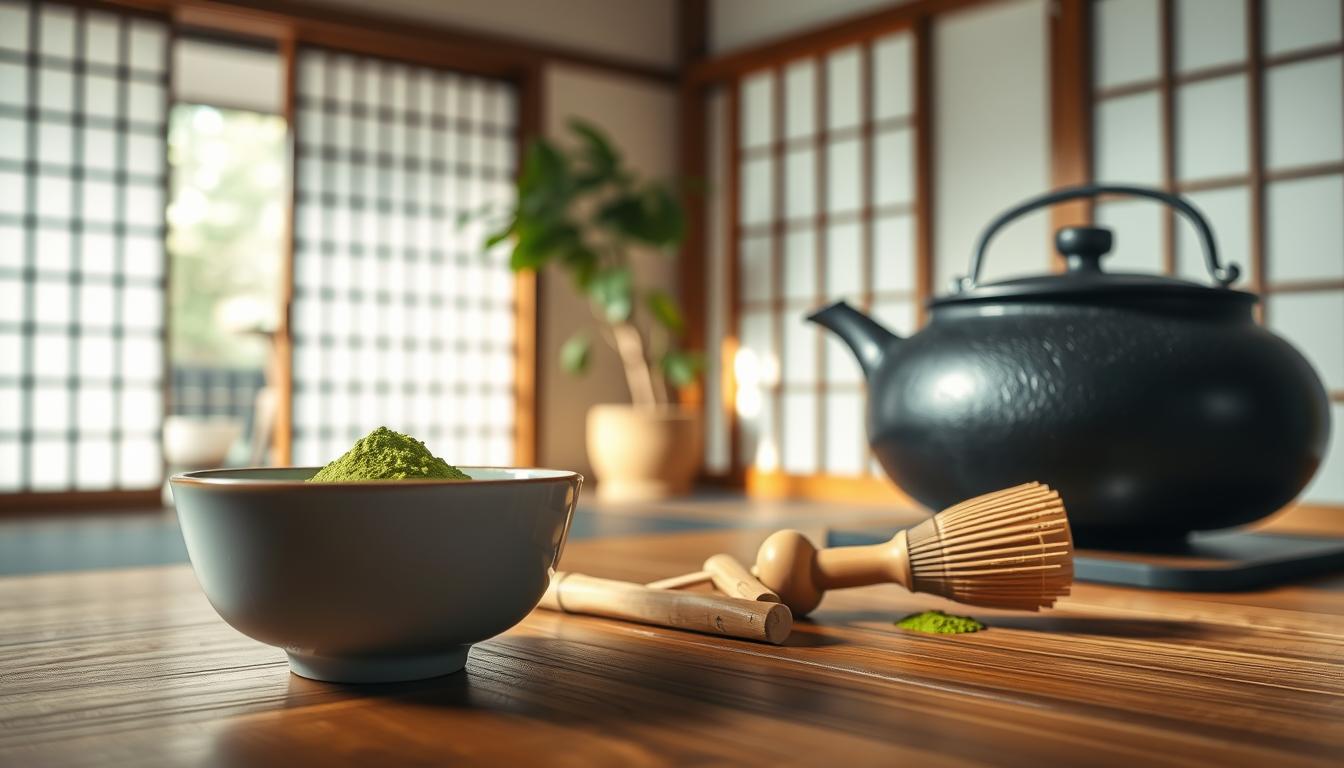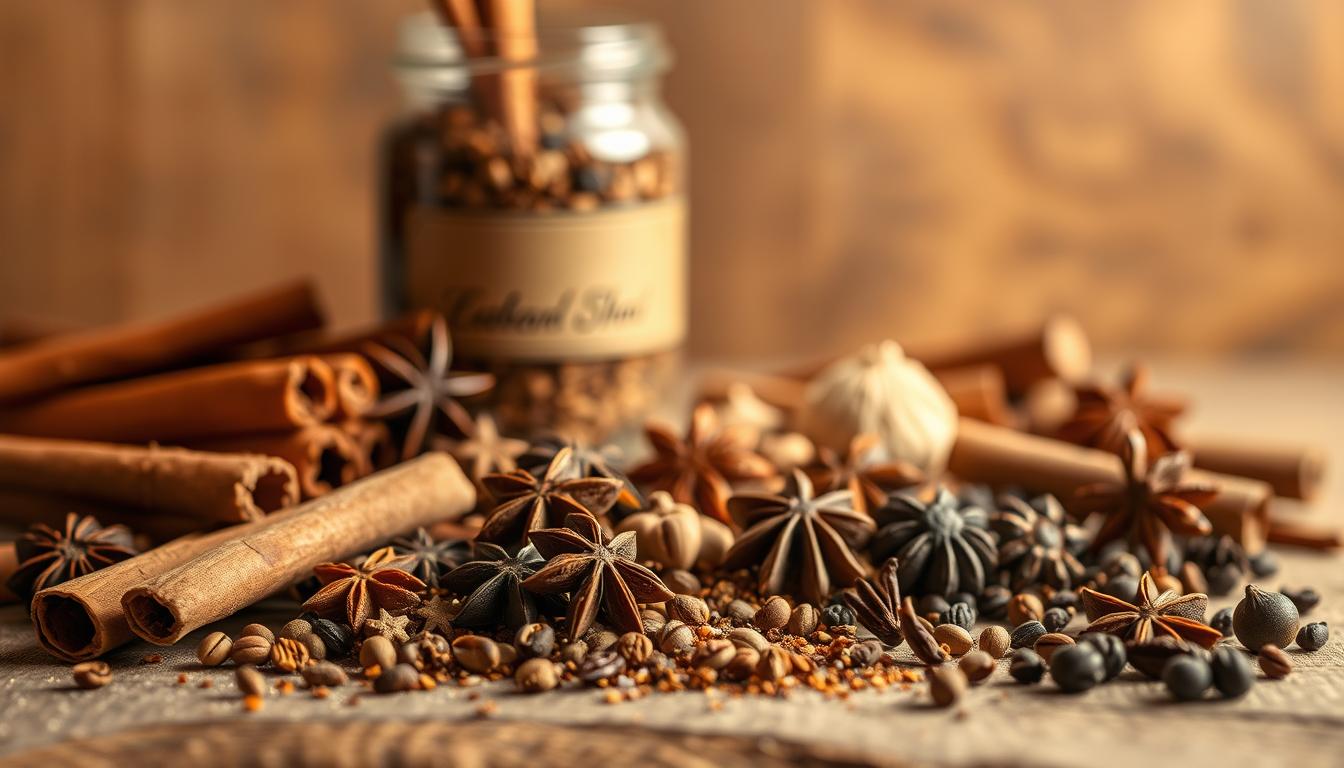Basil Tea Benefits: Wellness & Vitality Guide + Easy Recipe (2026)
Last updated: 2026
Discover the refreshing world of basil tea, a herbal infusion that combines the aromatic essence of basil leaves with numerous wellness-supporting properties. This delightful caffeine-free drink is not only a treat for the senses but also offers a range of wellness-supporting properties for overall vitality and natural balance.
As a type of herbal tea, this caffeine-free beverage is rich in plant-based compounds that support vitality, making it an excellent choice for those seeking a soothing drink. With its unique flavor profile and potential qualities that support calmness and balance, this aromatic infusion is an exciting addition to any tea enthusiast’s collection.
Quick Answer: What is Basil Tea?
Basil tea is a caffeine-free herbal infusion made by steeping fresh or dried basil leaves in hot water for 5-7 minutes. It offers a distinctive sweet, slightly spicy flavor with aromatic herbal notes. The most common varieties used are sweet basil (Ocimum basilicum) for mild flavor and holy basil/tulsi (Ocimum sanctum) for robust, peppery taste. Each cup provides plant-based compounds, essential oils, and traditional wellness support for digestive comfort and relaxation.
Table of Contents
The Aromatic World of Herbal Infusions
The aromatic world of herbal infusions is vast and diverse, offering something for every palate. As a part of this world, this popular infusion has been gaining attention for its unique flavor and potential wellness benefits.
The Rise of Botanical Beverages
The market for herbal infusions has seen significant growth, driven by consumers seeking healthier beverage options. This trend is part of a broader shift towards botanical beverages that are not only flavorful but also offer various wellness-supporting properties. According to market research, the global herbal tea market continues to expand as people prioritize natural, plant-based alternatives to traditional caffeinated beverages.
Where Basil Fits in the Herbal Tea Landscape
Basil herbal tea, made from the leaves of the basil plant, is a flavorful and aromatic addition to the herbal infusion family. It offers a distinct taste profile compared to other options, making it a unique choice for those looking to explore beyond traditional favorites like peppermint or chamomile. This aromatic brew is known for its potential to support the body’s natural balance and offers a refreshing, herbaceous flavor.
As the demand for herbal and botanical beverages continues to grow, this flavorful infusion is poised to become a favorite among those seeking new and exciting flavors in the world of tea.
What is Basil Tea?
This herbal beverage, made from the leaves of the Ocimum basilicum plant, is a versatile and aromatic drink. Basil in tea form can be enjoyed both hot and cold, offering wellness benefits and a soothing herbal experience.
This herbal infusion has been a cornerstone in various cultures, not only for its culinary appeal but also for its traditional wellness applications.
Definition and Basic Composition
This aromatic infusion is defined as a hot or cold beverage made from basil leaves. The basic composition includes basil leaves, which are rich in vitamins (including vitamin K and vitamin A), minerals (such as iron and calcium), and essential oils like eugenol and linalool. The drink can be prepared using fresh or dried basil leaves, with the option to add other herbs or spices for enhanced flavor.
Key Components of Basil Tea
- Essential oils (eugenol, linalool, citronellol)
- Vitamins K, A, and C
- Minerals including iron, calcium, and magnesium
- Plant-based compounds including flavonoids
- Natural aromatic compounds
Historical Uses Throughout Centuries
Historically, basil has been used in various cultures for its wellness and culinary properties. In ancient Greece and Rome, basil was considered a symbol of love and fertility. The use of this infusion dates back to traditional Ayurvedic practices, where it was valued for its natural balancing qualities. In traditional Chinese medicine, basil was incorporated into various herbal preparations for supporting digestive comfort and promoting a sense of calm.
Historical Timeline:
- Ancient Egypt: Used in embalming and religious ceremonies
- Ancient Greece/Rome: Symbol of love, used in culinary preparations
- Traditional Ayurveda: Holy basil (tulsi) revered for centuries
- Medieval Europe: Grown in monastery gardens for wellness purposes
- Modern Era: Growing popularity as a standalone herbal beverage
Traditional Wellness Uses
Traditionally, this aromatic brew has been used to soothe the body, encourage relaxation, and support overall vitality. Its wellness applications are rooted in supporting calmness and inner harmony and nourishing plant-based qualities. Some of the key traditional uses include:
- Supports ease of digestion
- Promotes calm and relaxation
- Supports overall vitality
- Encourages a sense of balance
- Traditionally valued for its aromatic qualities
The versatility of this herbal infusion makes it a valuable addition to traditional wellness practices around the world.
Varieties of Basil for Tea Making
The type of basil used can significantly impact the flavor and aroma of your brew. Various basil varieties are used, each with its unique characteristics.
Sweet Basil (Ocimum basilicum)
Sweet basil is one of the most commonly used basil varieties for brewing. It has a mild flavor and is known for its calming properties. This variety is a popular choice for those looking for a soothing, caffeine-free beverage. Sweet basil offers a slightly sweet, peppery taste with hints of anise and clove.
Flavor Profile: Mild, sweet, slightly peppery with subtle anise notes Best For: Daily drinking, blending with other herbs, introduction to basil tea
To compare caffeine content in other beverages, see our guide on Does Chai Have Caffeine? Chai vs Coffee.
You may also enjoy exploring Lemon Balm Tea, Moringa Tea or Saffron Tea for additional herbal wellness options.
Holy Basil/Tulsi (Ocimum sanctum)
Holy basil, also known as Tulsi, is revered for its wellness properties. This variety is believed to offer numerous wellness-supporting benefits, including stress-relieving qualities and support for overall vitality. Holy basil has a more robust, slightly spicy flavor compared to sweet basil, with peppery, clove-like notes.
Flavor Profile: Robust, spicy, peppery with clove undertones Best For: Evening relaxation, traditional wellness practices, deeper flavor experiences Cultural Significance: Considered sacred in Hindu tradition, used in daily rituals
Thai Basil and Other Exotic Varieties
Thai basil and other exotic varieties like Genovese basil and purple basil are also used for brewing. These varieties offer distinct flavor profiles, ranging from spicy to sweet.
Variety Comparison:
- Thai Basil: Licorice-like flavor, slightly spicy, aromatic
- Lemon Basil: Bright citrus notes, refreshing, light
- Purple Basil: Mild, slightly clove-like, visually striking
- Genovese Basil: Classic Italian flavor, sweet and aromatic
- Cinnamon Basil: Sweet, spicy, cinnamon undertones
Each variety brings its own character to the cup, allowing for endless experimentation and personalization.
Wellness Qualities of Basil Tea
This herbal infusion is more than just a refreshing drink; it’s a concoction of various wellness-supporting properties recognized in traditional wellness practices. This aromatic beverage has been used for centuries in traditional practices, and its popularity is now growing globally due to its numerous advantages.
Digestive Ease and Inner Balance
This aromatic brew is known for its digestive benefits, helping to soothe the stomach and support comfort. Its ability to promote comfort and balance may help ease occasional tension or bodily discomfort. Many traditional practices have incorporated this infusion after meals to support the digestive process.
Traditional Uses for Digestive Comfort:
- Enjoyed after heavy meals
- Consumed warm to support gentle digestion
- Combined with ginger for enhanced digestive support
- Used to promote feelings of lightness
Relaxing and Harmonizing Effects
Drinking this herbal infusion can be a calming experience, promoting relaxation and inner harmony. Certain varieties of basil, like holy basil, are considered adaptogenic in traditional practices, helping the body maintain balance and promoting overall calm and vitality.
Ways to Enhance Relaxation:
- Sip slowly in a quiet environment
- Pair with mindful breathing practices
- Enjoy as part of an evening routine
- Create a tea ritual for consistency
Plant-Based Compounds for Natural Vitality
This beverage is rich in plant-based compounds for natural vitality, which help the body cope with oxidative stress and support overall vitality. Regular consumption can contribute to maintaining natural balance and vitality.
Key Plant Compounds:
- Flavonoids (including orientin and vicenin)
- Essential oils (eugenol, linalool)
- Rosmarinic acid
- Caffeic acid
- Ursolic acid
Observations and Natural Insights
Various studies have investigated the wellness properties of this infusion, highlighting its potential to promote natural balance, vitality-supporting compounds and calming effects. For instance, research on holy basil has shown its potential in supporting relaxation and comfort. Traditional knowledge from Ayurvedic and Chinese medicine continues to inform modern understanding of basil’s traditional applications.
| Wellness Aspect | Natural Qualities | Traditional or Observed Insights |
|---|---|---|
| Digestive Comfort | Brings lightness and ease after meals | Traditionally valued for comfort |
| Relaxing Effect | Encourages calm and emotional balance | Traditionally appreciated for soothing effects |
| Plant-Based Compounds that Support Vitality | Helps maintain vitality and inner balance | Recognized for its vitality-supporting properties |
How to Brew the Perfect Cup of Basil Tea
To unlock the full flavor and wellness properties of this infusion, it’s essential to master the brewing process. The quality of basil leaves and the brewing technique can significantly affect the flavor and nutritional value.
Fresh vs. Dried Basil Leaves
The choice between fresh and dried basil leaves can impact the flavor and aroma of your brew. Fresh basil leaves provide a more vibrant and potent flavor, while dried basil leaves offer convenience and a longer shelf life. For a more intense flavor, fresh basil is recommended, but dried basil can be a good alternative when fresh is not available.
Fresh Basil:
- Brighter, more vibrant flavor
- Requires 8-10 leaves per cup
- Best used within days of harvest
- Rinse gently before use
Dried Basil:
- More concentrated flavor
- Requires 1-2 teaspoons per cup
- Stores for up to 1 year in airtight container
- More convenient for daily use
Step-by-Step Brewing Instructions
Brewing this aromatic infusion is a straightforward process that requires attention to detail. Here’s a step-by-step basil tea recipe:
Basic Brewing Method:
- Choose your basil leaves: Decide between fresh or dried leaves based on availability and preference
- Prepare the leaves: Rinse fresh leaves with cold water, or measure out dried leaves according to your recipe
- Heat the water: Use fresh, filtered water heated to the appropriate temperature (190°F-212°F / 88°C-100°C)
- Steep the brew: Combine basil leaves and hot water in a teapot or mug, and let it steep for 5-7 minutes
- Strain and serve: Remove leaves and enjoy hot, or let cool for iced preparations
Pro Tips:
- Gently bruise fresh leaves before steeping to release more oils
- Use a teapot with infuser for easy removal
- Cover while steeping to preserve aromatic compounds
- Adjust steeping time for stronger or milder flavor
Ideal Water Temperature and Steeping Time
The ideal water temperature for brewing this infusion is between 190°F to 212°F (88°C to 100°C). The steeping time can vary from 5 to 7 minutes, depending on your desired strength of flavor. Adjust the steeping time to suit your taste preferences.
Steeping Guide:
- Light brew: 3-4 minutes at 190°F (88°C)
- Medium brew: 5-6 minutes at 200°F (93°C)
- Strong brew: 7-8 minutes at 212°F (100°C)
Troubleshooting Common Brewing Issues
If your brew tastes too bitter, it might be due to over-steeping or using water that’s too hot. Conversely, if it’s too weak, you might need to adjust the amount of basil or the steeping time. Experiment with these variables to find your perfect cup.
Common Issues & Solutions:
- Too bitter: Reduce steeping time or lower water temperature
- Too weak: Add more leaves or increase steeping time
- Metallic taste: Use filtered water instead of tap water
- Grassy flavor: Ensure basil is fresh and properly stored
The Distinctive Flavor Profile
Stepping into the world of this aromatic infusion reveals a complex and intriguing flavor profile. The experience of sipping this beverage is not just about the taste; it’s also about the aromatic qualities that fill the senses.
Tasting Notes and Aromatic Qualities
This herbal brew is characterized by its distinctive sweet and slightly spicy notes. The aroma is equally captivating, with fragrant herbal undertones that enhance the overall drinking experience.
Detailed Tasting Notes:
- Initial Aroma: Fresh, herbaceous with sweet undertones
- First Sip: Gentle sweetness with peppery notes
- Mid-Palate: Smooth, slightly minty with herbal complexity
- Finish: Clean, refreshing with lingering aromatic qualities
- Aftertaste: Subtle sweetness with hints of anise or clove
How Different Basil Varieties Affect Taste
Different basil varieties significantly impact the flavor profile. For instance, Sweet Basil offers a milder taste, while Holy Basil provides a more robust and spicy flavor.
Flavor Comparison by Variety:
- Sweet Basil: Mild, slightly sweet, universally appealing
- Holy Basil: Bold, peppery, complex with clove notes
- Thai Basil: Licorice-forward, slightly spicy
- Lemon Basil: Bright, citrusy, refreshing
- Purple Basil: Subtle, slightly earthier than sweet basil
Seasonal Variations in Flavor Intensity
The flavor intensity can also vary with the seasons. Freshly harvested basil in summer yields a more vibrant taste, whereas dried basil used in winter may result in a milder flavor. Understanding these seasonal variations helps you appreciate the natural cycles of this remarkable plant.
Seasonal Considerations:
- Spring: Young leaves, delicate flavor, bright notes
- Summer: Peak intensity, full aromatic profile
- Fall: Mature leaves, deeper, earthier notes
- Winter: Dried leaves, concentrated but mellower flavor
Creative Ways to Enhance Your Basil Tea
Elevate your basil tea experience by experimenting with complementary herbs, spices, and other herbal infusions. You might also enjoy exploring Lavender Chamomile Tea or Chrysanthemum Tea for new flavor experiences.
Complementary Herbs and Spices
Combining basil with other herbs and spices can create unique and intriguing flavor profiles. For instance, adding a cinnamon stick or a few cloves can introduce warm, spicy notes. You can also experiment with ginger for its digestive benefits or lemongrass for a citrusy twist. Mint leaves can be another great addition, enhancing the brew’s refreshing quality.
Complementary Combinations:
- Basil + Mint: Refreshing, cooling, digestive support
- Basil + Ginger: Warming, spicy, invigorating
- Basil + Lemongrass: Citrusy, bright, uplifting
- Basil + Cinnamon: Sweet, warming, comforting
- Basil + Chamomile: Calming, soothing, evening blend
Natural Sweeteners and Citrus Additions
For those who prefer their beverage a bit sweeter, natural sweeteners like honey or stevia can be excellent choices. Adding a squeeze of fresh lemon or orange juice can also brighten up the flavor. Citrus not only adds a pleasant taste but may also enhance the absorption of plant-based compounds.
Sweetening Options:
- Raw Honey: Rich, floral, adds depth (add after brewing to preserve beneficial properties)
- Maple Syrup: Earthy sweetness, pairs well with stronger varieties
- Stevia: Zero calories, intensely sweet, use sparingly
- Agave Nectar: Smooth, mild sweetness
- Coconut Sugar: Caramel-like notes, subtle sweetness
Citrus Enhancements:
- Lemon: Bright, clarifying, classic pairing
- Lime: Tangy, tropical, refreshing
- Orange: Sweet, mellow, aromatic
- Grapefruit: Bitter-sweet, sophisticated
Basil Tea Lattes and Specialty Drinks
Transform your infusion into a latte by adding steamed milk and a touch of vanilla syrup. For a refreshing summer drink, try mixing cooled brew with sparkling water and a splash of fruit juice. These creative concoctions can make your experience even more enjoyable and versatile.
Specialty Drink Ideas:
- Basil Vanilla Latte: Brew + steamed oat milk + vanilla
- Iced Basil Chai: Brew + chai spices + milk + ice
- Basil Berry Spritzer: Chilled brew + mixed berries + sparkling water
- Golden Basil Turmeric: Brew + turmeric + black pepper + coconut milk
Refreshing Iced Basil Tea Recipes
Iced basil tea is a revitalizing beverage perfect for warm weather, offering a unique twist on traditional herbal infusions. As the temperature rises, this refreshing drink can be a great way to stay cool and hydrated.
Classic Iced Basil Tea
To make a classic chilled version, start by brewing a pot using fresh or dried basil leaves. Allow the brew to cool, then refrigerate it until chilled. Serve over ice and garnish with additional fresh basil leaves if desired.
Classic Iced Recipe:
Ingredients:
- 10-12 fresh basil leaves (or 2 tablespoons dried)
- 4 cups filtered water
- Ice cubes
- Fresh basil sprigs for garnish
- Optional: honey or sweetener to taste
Instructions:
- Bring water to 200°F (93°C)
- Add basil leaves to a heat-safe pitcher
- Pour hot water over leaves
- Steep for 6-7 minutes
- Strain and let cool to room temperature
- Refrigerate for at least 2 hours
- Serve over ice with fresh basil garnish
Basil-Citrus Summer Coolers
For a twist on the classic, try adding citrus to your chilled infusion. Lemon and lime are popular choices that complement the flavor of basil nicely. Simply squeeze a slice of citrus into the brew or add a few slices to the pitcher for added flavor.
| Recipe | Ingredients | Instructions |
|---|---|---|
| Basil Lemon Refresher | 1 cup iced infusion, 1/2 lemon sliced, Ice | Combine brew and lemon slices in a glass filled with ice |
| Basil Lime Cooler | 1 cup iced infusion, Juice of 1 lime, Ice | Squeeze lime juice into brew and serve over ice |
| Basil Orange Sunset | 1 cup iced infusion, Orange slices, Sparkling water | Layer brew with orange slices, top with sparkling water |
Tropical Basil Citrus Blend Recipe:
Ingredients:
- 3 cups brewed basil tea, chilled
- 1/2 cup fresh orange juice
- 1/4 cup fresh lime juice
- 2 tablespoons honey (optional)
- Orange and lime slices
- Fresh basil leaves
- Ice
Instructions:
- Mix chilled brew with citrus juices
- Add honey if desired and stir until dissolved
- Fill glasses with ice
- Pour mixture over ice
- Garnish with citrus slices and fresh basil
Sparkling Basil Tea Mocktails
For a more festive drink, try turning your chilled infusion into a sparkling mocktail. Add a splash of sparkling water for a refreshing fizz. You can also add a splash of fruit juice, such as pineapple or grapefruit, for added flavor.
Sparkling Basil Mojito Mocktail:
Ingredients:
- 1 cup chilled basil tea
- 10 fresh basil leaves
- 1 lime, cut into wedges
- 2 teaspoons coconut sugar or sweetener
- Sparkling water
- Ice
- Mint leaves for garnish
Instructions:
- In a glass, muddle basil leaves with lime wedges and sweetener
- Fill glass with ice
- Add chilled basil tea
- Top with sparkling water (about 1/2 cup)
- Stir gently
- Garnish with basil and mint leaves
Basil Berry Fizz:
Ingredients:
- 3/4 cup chilled basil tea
- 1/4 cup mixed berry juice
- 1/2 cup sparkling water
- Fresh berries (strawberries, blueberries, raspberries)
- Fresh basil sprig
- Ice
Instructions:
- Muddle a few berries in the bottom of a glass
- Add ice
- Pour in chilled tea and berry juice
- Top with sparkling water
- Garnish with berries and basil
These refreshing iced versions are perfect for hot summer days. Whether you prefer a classic basil tea recipe or something more elaborate, there’s an option to suit every taste.
Growing and Harvesting Basil for Tea
The journey to a perfect cup begins in the garden, where the right cultivation techniques can make all the difference. Growing your own basil allows you to control the quality and freshness, ensuring a flavorful and aromatic brew.
Garden-to-Cup: Cultivation Tips
To grow basil effectively, choose a location with plenty of sunlight and well-draining soil. Basil thrives in warm temperatures, typically between 60°F to 80°F (15°C to 27°C). Water your basil plants regularly, but avoid overwatering, which can lead to root rot.
Essential Growing Conditions:
- Light: 6-8 hours of direct sunlight daily
- Soil: Well-draining, rich in organic matter, pH 6.0-7.0
- Temperature: 60°F-80°F (15°C-27°C), protect from frost
- Water: Consistent moisture, allow soil to dry slightly between watering
- Spacing: 12-18 inches between plants for air circulation
Starting from Seed:
- Sow seeds indoors 6-8 weeks before last frost
- Keep soil warm (70°F-75°F) for germination
- Provide adequate light once sprouted
- Transplant outdoors after danger of frost has passed
Starting from Transplants:
- Purchase healthy seedlings from nursery
- Harden off plants gradually before planting
- Plant in prepared soil with compost
- Water well after transplanting
Harvesting at Peak Flavor
The best time to harvest basil is just before the plant flowers, when the leaves are at their most flavorful. Pinch or cut off the top sets of leaves to encourage branching and prevent the plant from flowering. Regular harvesting will promote healthy growth and a more abundant yield.
Harvesting Guidelines:
- Best Time of Day: Morning after dew dries, before afternoon heat
- Frequency: Harvest every 2-3 weeks during growing season
- Method: Cut stems just above a leaf node using clean scissors
- Amount: Never remove more than one-third of the plant at once
- Flower Management: Pinch off flower buds to extend leaf production
Signs of Peak Harvest Time:
- Leaves are large and vibrant
- Before flowering begins
- Early to mid-season growth
- Leaves have strong aromatic scent
Drying and Preserving Methods
To preserve your basil harvest, you can dry the leaves using a dehydrator or by tying them in small bunches and hanging them upside down in a warm, dry place. Store dried basil in airtight containers to maintain its flavor and aroma.
Air Drying Method:
- Tie 5-7 stems together with twine
- Hang upside down in warm, dark, well-ventilated area
- Dry for 1-2 weeks until leaves crumble easily
- Remove leaves from stems
- Store in airtight glass jars
Dehydrator Method:
- Rinse and pat leaves dry
- Arrange in single layer on dehydrator trays
- Set temperature to 95°F-115°F (35°C-46°C)
- Dry for 4-6 hours until crispy
- Cool completely before storing
Oven Drying Method:
- Preheat oven to lowest setting (150°F-200°F)
- Arrange leaves on baking sheet
- Prop oven door open slightly
- Dry for 2-4 hours, checking frequently
- Cool and store once crispy
Storage Tips:
- Use dark glass jars to protect from light
- Store in cool, dry place away from heat
- Label with variety and date
- Properly stored dried basil lasts 6-12 months
Indoor Growing Solutions
For those without outdoor space, basil can be grown indoors using pots or indoor herb gardens. Ensure your indoor basil receives sufficient light, ideally from a south-facing window or under grow lights.
Indoor Growing Setup:
- Container: 6-8 inch pot with drainage holes
- Soil: High-quality potting mix
- Light: South-facing window or grow lights 12-16 hours daily
- Temperature: Maintain 65°F-75°F (18°C-24°C)
- Humidity: Mist occasionally or use humidity tray
- Watering: Keep soil consistently moist but not waterlogged
Grow Light Recommendations:
- Full spectrum LED lights
- Position 6-12 inches above plants
- Run 14-16 hours per day
- Adjust height as plants grow
By following these tips on growing, harvesting, and preserving basil, you can enjoy high-quality infusions throughout the year.
Commercial Basil Tea Products
As interest in herbal beverages grows, commercial basil tea products are becoming increasingly popular. The market now offers a wide range of options, varying in quality, price, and brand reputation.
Popular Brands and Products
Several brands have emerged as leaders in the market. These include Traditional Medicinals, Teavana, and Herbal Tea Co., offering high-quality products that are widely available in stores and online.
Notable Commercial Options:
- Traditional Medicinals Organic Tulsi Tea: Holy basil focused, certified organic
- Organic India Tulsi Tea: Multiple tulsi varieties, fair trade
- Pukka Three Tulsi: Blend of rama, krishna, and vana tulsi
- Yogi Tea Honey Chai Turmeric Vitality: Basil as supporting ingredient
- Buddha Teas Organic Holy Basil: Single-ingredient, bleach-free tea bags
What to Look for When Purchasing
When buying commercial products, look for options that are organic and fair-trade. Check the ingredient list to ensure it contains 100% basil leaves without additives.
Quality Indicators:
- Organic Certification: USDA Organic or equivalent
- Fair Trade: Ensures ethical sourcing
- Non-GMO: No genetically modified ingredients
- No Additives: Pure basil without fillers or artificial flavors
- Packaging: Sealed, light-protective packaging
- Transparency: Clear sourcing and processing information
What to Avoid:
- Added sugars or sweeteners
- Artificial flavors or colors
- Bleached tea bags
- Unclear ingredient lists
- Expired products
Price Points and Quality Indicators
| Brand | Price Range | Quality Indicators |
|---|---|---|
| Traditional Medicinals | $5-$10 | Organic, Fair Trade |
| Teavana | $7-$12 | High-quality leaves, Unique blends |
| Herbal Tea Co. | $4-$8 | 100% Basil, No additives |
| Organic India | $6-$11 | Certified Organic, Multiple certifications |
| Buddha Teas | $5-$9 | Organic, Bleach-free bags, Single ingredient |
Value Considerations:
- Cost per cup (typically $0.25-$0.50)
- Number of servings per package
- Reusability of leaves (loose leaf can be steeped multiple times)
- Organic certification value
- Supporting sustainable and ethical brands
Understanding these factors can help you make an informed decision when purchasing commercial products.
Basil Tea Compared to Other Herbal Infusions
When exploring the world of herbal beverages, basil tea stands out for its unique flavor and wellness properties. You can also explore other similar infusions like Moringa tea, Chrysanthemum tea, or Lemon balm tea to discover different flavors and wellness benefits.
Basil vs. Mint: Flavor and Wellness Comparison
Basil and mint infusions are both known for their refreshing qualities, but they differ significantly in terms of flavor and benefits. While mint is renowned for its cooling effect and digestive support, basil offers a more subtle, slightly spicy flavor and is rich in plant-based compounds that support vitality. The choice between the two often comes down to personal preference and overall wellness goals.
Detailed Comparison:
Flavor Differences:
- Basil: Sweet, slightly spicy, aromatic with anise/clove notes
- Mint: Cooling, refreshing, mentholated, crisp
Traditional Uses:
- Basil: Supporting calm, digestive ease, vitality
- Mint: Cooling sensation, digestive comfort, freshness
Best Uses:
- Basil: Anytime beverage, pairs with meals, evening relaxation
- Mint: After meals, hot weather refreshment, morning wake-up
Basil vs. Chamomile: When to Enjoy Each
Chamomile is famous for its calming effects, making it an ideal bedtime drink. In contrast, basil infusion, while also having a calming effect, is more versatile and can be consumed at any time of day. Its natural balancing qualities help in managing stress, whereas chamomile is better suited for promoting sleep and relaxation.
Usage Guide:
Chamomile:
- Best Time: Evening, before bed
- Purpose: Sleep preparation, deep relaxation
- Flavor: Floral, apple-like, mildly sweet
- Effect: Sedative-like calming
Basil:
- Best Time: Morning, afternoon, evening
- Purpose: Gentle calm without drowsiness, digestive support
- Flavor: Herbaceous, complex, aromatic
- Effect: Balanced relaxation while maintaining alertness
Unique Qualities That Set Basil Tea Apart
This herbal beverage’s unique blend of flavor and nutritional benefits sets it apart from other herbal infusions. Its plant-based compounds and potential to support the body’s natural balance make it a popular choice for those seeking a wholesome beverage option. The table below summarizes the key differences between various infusions.
| Herbal Infusion | Flavor Profile | Wellness Qualities | Best Time to Enjoy |
|---|---|---|---|
| Basil | Subtle, slightly spicy | Rich in plant-based compounds that support vitality | Morning, afternoon, evening |
| Mint | Cooling, refreshing | Brings digestive comfort and a fresh sensation | After meals, hot weather |
| Chamomile | Calming, floral | Encourages relaxation and restful moments | Evening, before bed |
| Lavender | Floral, perfumed | Promotes tranquility and peaceful feelings | Evening relaxation |
| Ginger | Spicy, warming | Supports digestive wellness and warmth | Morning, after meals |
Distinctive Basil Tea Advantages:
- Versatility: Suitable for any time of day without drowsiness
- Flavor Complexity: More nuanced than single-note herbs
- Culinary Crossover: Familiar taste for herb enthusiasts
- Adaptogenic Qualities: Holy basil varieties support balance
- Rich Aromatic Profile: Essential oils provide depth
- Cultural Significance: Thousands of years of traditional use
Basil Tea for Different Wellness Goals
Understanding how to incorporate this herbal infusion into your daily routine based on your personal wellness goals can enhance your experience. Here’s a guide to timing and preparation based on common wellness objectives.
Morning Vitality Support
Start your day with a cup of basil tea to support alertness and natural balance without the jitters associated with caffeine.
Morning Preparation:
- Use sweet basil or lemon basil for bright, uplifting notes
- Brew for 5 minutes for lighter, energizing flavor
- Add fresh lemon juice for vitamin C
- Enjoy with breakfast or 30 minutes before
- Pair with ginger for enhanced morning vitality
Morning Blend Recipe:
Ingredients:
- 8-10 fresh sweet basil leaves (or 1.5 tsp dried)
- 1/4 inch fresh ginger, sliced
- Juice of 1/4 lemon
- 1 cup hot water (200°F/93°C)
- Optional: 1/2 tsp raw honey
Instructions:
- Place basil and ginger in teapot
- Pour hot water over herbs
- Steep for 5 minutes
- Strain into cup
- Add lemon juice and honey if desired
- Enjoy warm
Afternoon Digestive Support
Mid-day is an ideal time for basil tea, especially after lunch to support comfortable digestion and maintain afternoon energy.
Afternoon Preparation:
- Choose sweet basil or Thai basil for balanced flavor
- Brew for 6 minutes for fuller body
- Add mint leaves for enhanced digestive comfort
- Serve warm or at room temperature
- Can be enjoyed 20-30 minutes after meals
Digestive Comfort Blend:
Ingredients:
- 6 fresh basil leaves
- 4 fresh mint leaves
- 1 tsp fennel seeds
- 1 cup hot water
- Squeeze of lime
Instructions:
- Lightly crush fennel seeds
- Combine all herbs in infuser
- Pour hot water over mixture
- Steep for 6-7 minutes
- Strain and add lime
- Sip slowly after lunch
Evening Relaxation Ritual
Wind down with a calming cup of basil tea to promote relaxation and prepare for restful sleep.
Evening Preparation:
- Select holy basil (tulsi) for adaptogenic properties
- Brew for 7 minutes for deeper, mellower flavor
- Add chamomile for enhanced calming effect
- Serve warm, not hot
- Enjoy 1-2 hours before bedtime
Evening Calm Blend:
Ingredients:
- 1 tbsp dried holy basil (or 12 fresh leaves)
- 1 tsp dried chamomile flowers
- 1 small cinnamon stick
- 1.5 cups hot water
- Optional: 1 tsp coconut milk
Instructions:
- Combine herbs in teapot
- Add hot water (not boiling – 190°F/88°C)
- Steep for 7-8 minutes
- Strain into favorite mug
- Add coconut milk for creaminess
- Sip slowly in relaxing environment
Seasonal Basil Tea Variations
Adapt your basil tea experience throughout the year with seasonal variations that celebrate fresh, local ingredients and align with the body’s natural rhythms.
Spring Renewal Blend
Welcome spring with light, refreshing combinations that support renewal and vitality.
Spring Garden Tea:
Ingredients:
- 8 fresh sweet basil leaves (new spring growth)
- 3 fresh mint leaves
- 2 thin slices cucumber
- 1 tsp dried elderflower
- Splash of fresh apple juice
- 1 cup hot water
Instructions:
- Muddle cucumber gently in bottom of cup
- Add basil, mint, and elderflower
- Pour hot water over ingredients
- Steep for 5 minutes
- Strain and add apple juice
- Serve warm or chilled
Best For: Morning vitality, supporting seasonal transitions, light refreshment
Summer Cooling Infusion
Stay refreshed during hot weather with cooling variations served over ice.
Watermelon Basil Refresher:
Ingredients:
- 10 fresh basil leaves
- 1 cup brewed basil tea, chilled
- 1/2 cup fresh watermelon juice
- Juice of 1 lime
- Fresh watermelon cubes
- Ice
- Sparkling water (optional)
Instructions:
- Brew basil tea and chill completely
- Muddle 3-4 basil leaves in glass
- Add ice and watermelon cubes
- Pour chilled tea and watermelon juice
- Add lime juice
- Top with sparkling water if desired
- Garnish with basil sprig and watermelon
Best For: Hydration, outdoor gatherings, hot afternoon refreshment
Autumn Comfort Blend
Embrace cozy autumn flavors with warming spices and seasonal fruits.
Apple Cinnamon Basil Tea:
Ingredients:
- 1.5 tbsp dried basil (or 10 fresh leaves)
- 1 cinnamon stick
- 2 whole cloves
- 1/4 cup unsweetened apple cider
- 1 star anise
- 1 cup hot water
- Optional: 1 tsp maple syrup
Instructions:
- Place basil and spices in teapot
- Heat apple cider separately (don’t boil)
- Pour hot water over herbs and spices
- Steep for 6-7 minutes
- Strain into mug
- Add warm apple cider
- Sweeten with maple syrup if desired
- Garnish with cinnamon stick
Best For: Evening comfort, supporting warmth, seasonal enjoyment
Winter Warming Blend
Support your body through cold months with robust, spicy variations.
Ginger Turmeric Basil Tea:
Ingredients:
- 1 tbsp dried holy basil
- 1 inch fresh ginger, grated
- 1/2 tsp turmeric powder
- Pinch of black pepper (enhances turmeric)
- 1 cardamom pod, crushed
- 1.5 cups hot water
- 1 tsp coconut oil
- 1 tsp honey
Instructions:
- Combine basil, ginger, turmeric, pepper, and cardamom
- Pour hot water over mixture
- Steep for 8 minutes
- Strain into mug
- Stir in coconut oil and honey while hot
- Mix well until oil is incorporated
Best For: Supporting warmth, winter wellness, evening comfort
Basil Tea Blending Guide
Create your own signature blends by understanding which flavors complement basil’s unique profile.
Complementary Flavor Pairings
Citrus Family:
- Lemon: Brightens, adds vitamin C, classic pairing
- Lime: Tangy, tropical, refreshing
- Orange: Sweet, mellow, aromatic
- Grapefruit: Sophisticated, slightly bitter balance
Herbal Companions:
- Mint: Cooling, digestive support, refreshing
- Chamomile: Calming, floral, evening blend
- Lavender: Relaxing, aromatic, use sparingly
- Lemongrass: Citrusy, bright, Southeast Asian fusion
- Rosemary: Earthy, aromatic, savory notes
Spice Additions:
- Ginger: Warming, digestive, spicy kick
- Cinnamon: Sweet, warming, comforting
- Cardamom: Floral, sweet, exotic
- Cloves: Strong, warming, use minimally (1-2 whole)
- Star Anise: Licorice notes, pairs with Thai basil
Fruit Infusions:
- Berries: Sweet-tart, antioxidant-rich
- Apple: Mild, naturally sweet, autumn-perfect
- Peach: Delicate, summer-fresh
- Pineapple: Tropical, bold, refreshing
Creating Balanced Blends
The Formula for Perfect Blends:
- Base (50-60%): Basil variety of choice
- Complementary Herb (20-30%): Mint, chamomile, or lemongrass
- Accent Spice (10-15%): Ginger, cinnamon, or cardamom
- Flavor Enhancer (5-10%): Citrus, fruit, or sweetener
Example Custom Blend:
- 2 tsp dried sweet basil (base – 60%)
- 1 tsp dried mint (complementary – 30%)
- 1/4 tsp grated ginger (accent – 10%)
- Splash of lemon juice (enhancer)
Blend Storage and Preparation
Making Large Batches:
- Mix dried ingredients in desired proportions
- Store in airtight glass jar in cool, dark place
- Label with blend name, date, and ratio
- Use within 6 months for best flavor
- Use 1-2 tsp blend per 8 oz water
Testing New Combinations:
- Start with small batches (1-2 cups worth)
- Keep notes on ratios and steeping times
- Adjust proportions based on taste
- Consider brewing temperature for delicate ingredients
Basil Tea in Culinary Applications
Beyond drinking, basil tea can be incorporated into cooking and baking for unique flavor profiles.
Cooking with Basil Tea
Basil Tea Rice:
Ingredients:
- 1 cup jasmine or basmati rice
- 1.5 cups strong basil tea (double strength)
- 1/2 cup coconut milk
- Pinch of salt
- Fresh basil for garnish
Instructions:
- Brew extra-strong basil tea (2x normal amount)
- Combine tea and coconut milk
- Use as cooking liquid for rice
- Cook rice according to package directions
- Fluff with fork and garnish with fresh basil
Basil Tea Poached Fruit:
Ingredients:
- 2 cups basil tea
- 1/4 cup honey or coconut sugar
- 4 pears or apples, peeled and halved
- 1 cinnamon stick
- 1 star anise
Instructions:
- Combine tea, sweetener, and spices in saucepan
- Bring to gentle simmer
- Add fruit
- Poach for 15-20 minutes until tender
- Serve warm with poaching liquid
Baking with Basil Tea
Basil Tea Infused Syrup:
Ingredients:
- 1 cup strong basil tea
- 1 cup sugar (white or coconut)
- Juice of 1 lemon
Instructions:
- Combine hot tea and sugar in saucepan
- Stir over medium heat until sugar dissolves
- Simmer for 10 minutes to reduce slightly
- Add lemon juice
- Cool completely
- Store in refrigerator for up to 2 weeks
Uses for Syrup:
- Drizzle over cakes and desserts
- Sweeten iced tea or lemonade
- Mix into cocktails or mocktails
- Glaze for fruit tarts
Basil Tea Cake:
Ingredients:
- 1 cup strong basil tea, cooled
- 1.5 cups all-purpose flour
- 1 cup sugar
- 1/2 cup oil
- 2 eggs
- 1 tsp baking powder
- 1/2 tsp baking soda
- Zest of 1 lemon
- Pinch of salt
Instructions:
- Preheat oven to 350°F (175°C)
- Grease 9-inch cake pan
- Whisk together dry ingredients
- Beat eggs, sugar, and oil
- Alternate adding dry ingredients and basil tea
- Fold in lemon zest
- Pour into pan
- Bake 35-40 minutes
- Cool and glaze with basil tea syrup
Basil Tea Pairings with Food
Enhance your meals by pairing basil tea with complementary dishes.
Breakfast Pairings
Best Matches:
- Yogurt with honey and granola
- Avocado toast with lemon
- Fruit salad with citrus
- Whole grain muffins
- Scrambled eggs with herbs
Why It Works: The light, herbaceous notes complement fresh breakfast flavors without overwhelming delicate morning palates.
Lunch Pairings
Best Matches:
- Mediterranean salads
- Grilled vegetables
- Light pasta dishes
- Sandwiches with fresh ingredients
- Grain bowls with herbs
Why It Works: Basil tea’s aromatic qualities enhance vegetable-forward dishes and support comfortable digestion.
Dinner Pairings
Best Matches:
- Italian cuisine (naturally!)
- Thai or Vietnamese dishes
- Grilled fish or chicken
- Roasted vegetables
- Light soups
Why It Works: The complex flavor profile complements both familiar and exotic cuisines.
Dessert Pairings
Best Matches:
- Lemon sorbet or gelato
- Fruit tarts
- Light sponge cakes
- Panna cotta
- Dark chocolate (70%+)
Why It Works: Basil’s subtle sweetness and herbal notes balance rich desserts and enhance fruit-based sweets.
Sustainable Basil Tea Practices
Make your basil tea habit more environmentally friendly with these sustainable practices.
Eco-Friendly Sourcing
What to Look For:
- Organic Certification: Reduces pesticide use
- Fair Trade: Ensures ethical labor practices
- Local Sources: Reduces transportation emissions
- Minimal Packaging: Choose bulk or recyclable packaging
- Sustainable Farming: Supports biodiversity
Growing Your Own Sustainably
Sustainable Growing Practices:
- Use organic seeds and soil
- Collect rainwater for irrigation
- Compost basil stems and spent leaves
- Companion plant with tomatoes and peppers
- Save seeds for next season
- Use natural pest control methods
Zero-Waste Tea Preparation
Reducing Waste:
- Use loose leaf basil instead of tea bags
- Compost used basil leaves
- Choose reusable tea infusers
- Brew with filtered tap water (reduce bottled water)
- Reuse leaves for second steeping
- Make ice cubes from leftover tea
Repurposing Used Basil Leaves:
- Add to compost for nutrient-rich soil
- Mix into face masks (fresh leaves only)
- Use in foot soaks
- Add to bath water for aromatic experience
- Dry completely and use as natural potpourri
Storing and Preserving Basil Tea
Proper storage ensures your basil tea maintains optimal flavor and freshness.
Short-Term Storage
Fresh Basil Leaves:
- Trim stems and place in water like flowers
- Cover loosely with plastic bag
- Store at room temperature away from direct sunlight
- Change water every 2-3 days
- Use within 7-10 days
Alternative Method:
- Wrap in slightly damp paper towel
- Place in breathable produce bag
- Store in refrigerator crisper drawer
- Use within 5-7 days
Long-Term Storage
Dried Basil Storage:
- Store in airtight glass jars (amber glass preferred)
- Keep in cool, dark, dry place
- Away from heat sources and humidity
- Label with variety and date
- Best used within 6-12 months
- Whole leaves retain flavor longer than crushed
Freezing Fresh Basil:
Ice Cube Method:
- Blend fresh basil with small amount of water
- Pour into ice cube trays
- Freeze completely
- Transfer cubes to freezer bag
- Use 1-2 cubes per cup of tea
- Stores for up to 6 months
Flash Freeze Method:
- Wash and dry basil leaves completely
- Arrange in single layer on baking sheet
- Freeze for 2 hours
- Transfer to freezer bag
- Remove air and seal
- Use within 3-4 months
Checking for Freshness
Checking for Freshness
Fresh Basil Signs:
- Vibrant green color
- Strong aromatic scent
- Firm, non-wilted leaves
- No dark spots or discoloration
Dried Basil Signs:
- Strong herbal aroma when crushed
- Intact leaf structure
- Green-gray color (not brown)
- Dry, crumbly texture
When to Discard:
- Moldy appearance
- Musty or off odor
- Completely brown or black color
- No aroma when crushed
Troubleshooting Common Basil Tea Challenges
Solve common issues to perfect your basil tea experience.
Problem: Tea Tastes Bitter
Possible Causes:
- Over-steeping (more than 10 minutes)
- Water temperature too high
- Using damaged or oxidized leaves
- Too much basil per cup
Solutions:
- Reduce steeping time to 5-7 minutes
- Lower water temperature to 190-200°F (88-93°C)
- Use fresh, vibrant leaves
- Use 8-10 fresh leaves or 1-1.5 tsp dried per cup
Problem: Tea Tastes Weak or Flavorless
Possible Causes:
- Insufficient basil quantity
- Steeping time too short
- Water not hot enough
- Old or improperly stored basil
Solutions:
- Increase to 12-15 fresh leaves or 2 tsp dried
- Steep for full 7-8 minutes
- Ensure water is 200-212°F (93-100°C)
- Use fresh basil or recently dried leaves
Problem: Leaves Turn Brown in Water
Cause:
- Natural oxidation process (like cut apples)
Solutions:
- This is normal and doesn’t affect flavor
- Bruise leaves gently rather than cutting
- Add drop of lemon juice to slow oxidation
- Strain before serving for better presentation
Problem: Tea Has Soapy or Chemical Taste
Possible Causes:
- Pesticide residue on leaves
- Unwashed basil
- Certain basil varieties (some people are sensitive)
Solutions:
- Use organic basil
- Wash thoroughly before brewing
- Try different variety (sweet basil usually milder)
- Rinse leaves with filtered water
Problem: Inconsistent Flavor Between Batches
Possible Causes:
- Variable steeping times
- Different water temperatures
- Seasonal variations in basil
- Inconsistent measurements
Solutions:
- Use timer for consistent steeping
- Use thermometer for water temperature
- Keep brewing journal with notes
- Measure basil with spoon or scale
Discover other herbal wellness guides.
Conclusion
This aromatic infusion offers a unique blend of flavor and nutrition, making it an excellent choice for those seeking a wellness-oriented beverage option. With its range of wellness-supporting properties, including digestive comfort and potential to promote natural balance and inner harmony, this herbal brew is a great way to enhance your overall well-being.
Key Takeaways:
- Versatile Beverage: Enjoy hot or cold, morning through evening
- Rich Tradition: Thousands of years of cultural and wellness use
- Easy to Prepare: Simple brewing process with flexible methods
- Customizable: Endless combinations with herbs, spices, and fruits
- Sustainable: Grow your own or source ethically
- Caffeine-Free: Natural energy support without jitters
- Culinary Applications: Beyond tea into cooking and baking
For more herbal options and insights on caffeine, explore Lemon Balm Tea, Moringa Tea, Saffron tea, or our guide on Does Chai Have Caffeine?.
In summary, the wellness properties of this beverage are numerous, and incorporating it into your daily routine can contribute to your sense of well-being. Whether you prefer it hot or iced, sweetened or unsweetened, pure or blended, this versatile drink can be enjoyed in various ways throughout the year.
As you consider adding this infusion to your daily routine, keep in mind the different varieties, brewing methods, and creative applications that can enhance your experience. With its unique flavor profile, numerous wellness benefits, and rich cultural heritage, this aromatic brew is sure to become a favorite among tea enthusiasts and health-conscious individuals alike.
Start Your Basil Tea Journey Today:
- Choose your basil variety (sweet for beginners, holy for deeper experience)
- Gather fresh leaves or purchase quality dried basil
- Follow the simple brewing instructions
- Experiment with different additions and preparations
- Make it part of your daily wellness routine
For your final thoughts, consider exploring the many creative ways to enjoy this beverage, from lattes to mocktails, culinary applications to seasonal variations, and discover the perfect way to make it a cherished part of your daily life. The journey of discovering basil tea is as rewarding as the cup itself.
FAQ
What is basil tea?
This herbal infusion is made from basil leaves, known for its aromatic qualities that support calmness, vitality, and comfort. It’s a caffeine-free beverage that can be enjoyed hot or cold, prepared with either fresh or dried basil leaves steeped in hot water for 5-7 minutes.
What are the wellness qualities of basil tea?
This beverage is rich in plant-based compounds that support vitality and may help promote natural balance, relaxation, and digestive comfort. Traditional practices have valued it for supporting calm, inner harmony, and overall wellness.
How do I brew basil tea?
To brew, use 8-10 fresh basil leaves or 1-2 teaspoons dried basil per cup of water. Heat filtered water to 190-212°F (88-100°C), pour over basil, and steep for 5-7 minutes depending on your desired strength of flavor. Strain and enjoy.
Can I use different types of basil for tea?
Yes, various basil varieties like sweet basil, holy basil (tulsi), Thai basil, lemon basil, and purple basil can be used, each offering a unique flavor profile. Sweet basil provides mild, slightly sweet taste while holy basil offers robust, peppery notes.
How can I enhance the flavor of my basil tea?
You can enhance the flavor by adding complementary herbs like mint or chamomile, spices such as ginger or cinnamon, natural sweeteners like honey or maple syrup, or citrus juice from lemon, lime, or orange. Experiment with combinations to find your perfect blend.
Is basil tea available in stores?
Yes, commercial basil tea products are available in stores and online, offered by various brands including Traditional Medicinals, Organic India, Pukka, and Buddha Teas. Look for organic, fair-trade options with 100% basil leaves and no additives.
Can I grow my own basil for tea?
Yes, growing your own basil ensures freshness and quality. Basil can be grown indoors or outdoors with proper cultivation. It needs 6-8 hours of sunlight, well-draining soil, consistent watering, and temperatures between 60-80°F (15-27°C).
How does basil tea compare to other herbal teas?
This infusion has a unique flavor profile and offers distinct qualities that support calmness, vitality, and comfort compared to other options like mint (cooling, digestive) and chamomile (sedative, sleep-promoting). Basil tea is more versatile and can be enjoyed any time of day.
Can I make iced basil tea?
Yes, iced versions can be made by brewing hot tea and then chilling it in the refrigerator, or by cold-brewing basil leaves in room temperature water for 4-8 hours. Serve over ice with fresh basil, citrus, or fruit for refreshing summer beverages.
Are there any precautions or sensitivities to consider with basil tea?
While generally considered safe for most people, excessive consumption may not suit everyone. Enjoy it in moderation to fully appreciate its natural qualities. If you have specific health concerns, allergies to mint family plants, or are pregnant/nursing, consult with a healthcare professional before adding any new herbal beverage to your routine.
How long does brewed basil tea last?
Freshly brewed basil tea can be stored in the refrigerator for 3-4 days in an airtight container. For best flavor and aromatic qualities, consume within 24-48 hours. Always smell and check appearance before drinking refrigerated tea.
What’s the best time of day to drink basil tea?
Basil tea is versatile and can be enjoyed any time. Sweet basil varieties work well for morning vitality, throughout the afternoon for digestive support, and holy basil is excellent for evening relaxation. Unlike caffeinated beverages, it won’t interfere with sleep when consumed in the evening.
Enjoy the full benefits of herbal teas!
Discover more recipes, tips, and wellness guides to make every cup of tea a revitalizing experience. Explore More Herbal Teas
Written by Doo & Rita
Doo and Rita are sisters, herbal wellness enthusiasts, and DIY beauty lovers who explore plant-based ingredients through hands-on experiments. We share tips and recipes we personally test, always with a gentle, nature-first approach.
Disclaimer: The information provided in this article is for educational and lifestyle purposes only and is not intended as medical advice. It does not diagnose, treat, cure, or prevent any disease. Always listen to your body and consult a qualified healthcare professional for personal health concerns.


